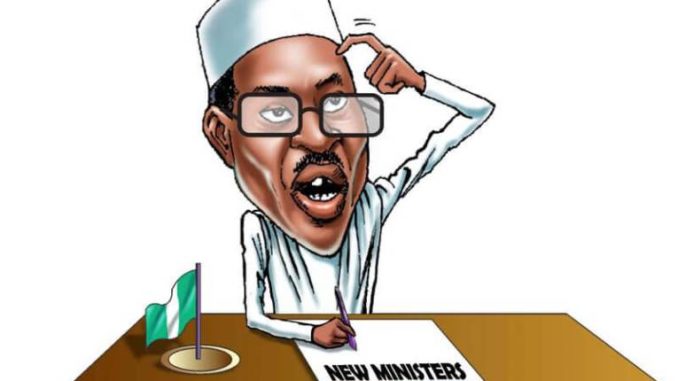
The administration may not have done much to bring about any level of change in the country. But by far its biggest handicap is the skinny nature (absence, may be) of its vision. There’s a part played here by the laconic propensity of the president. A less curt persona may have invited insights into his vision of possible solutions…
Those who would defend the Buhari administration against charges of incompetence, invariably offer two explanations for the administration’s apparent failure to deliver on its pre-election promises. The first explanation seeks to minimise the administration’s agency. According to it, such was the ineptitude of the Jonathan administration that it bequeathed a poisoned chalice to its immediate successor. Then, critics of the administration are also invited to recognise the “fact” that the task of fixing the rot that is the Nigerian state would take all of a generation — if not more. The point here being that it is unfair to assess the administration after only two years in office.
One not-so-obvious difficulty with the latter part of the pro-Buhari narrative is that it holds out the possibility that supporters of the administration might one day demand a thirty-year tenure for it in order to set the country right. The incompetence that litters the highest offices of the state across the continent, and the unusual longevity in office of African potentates, is unfortunately premised on such thinking. Even then, two things currently stand in the way of this possibility today: Mr. Buhari’s age; and constitutional restrictions on how long a leader can remain in office before elections are held.
Underlying both these excuses for the incumbent government is a rarely voiced acknowledgement: that the administration has not done as much as its pre-election rhetoric suggested. This is not about the “eternity” taken by the administration to set itself up, in the first place. Although that was useful, in itself, as a precursor of the quiescent pace of governance that we have now become familiar with. It isn’t also about the recent admission by the works and housing minister that his ministry did not carry out any capital project last year. Truth is, it barely carried out any the year before, either. Again, though, Mr. Babatunde Fashola’s fessing up supports the sense that we haven’t invested any more in driving capacity and productivity growth under the Buhari administration than we did under any of its immediate predecessors. Nor is the problem with the incumbent administration derivable from the fact that the recent return to economic growth, albeit slow, owes largely to the recovery in the global market for crude oil; and not to our design.
The administration may not have done much to bring about any level of change in the country. But by far its biggest handicap is the skinny nature (absence, may be) of its vision. There’s a part played here by the laconic propensity of the president. A less curt persona may have invited insights into his vision of possible solutions to the myriad (political, social, and economic) problems confronting the economy. And these insights could then have formed part of the building blocks of possible solutions. Only slightly less injurious than Mr. Buhari’s difficulty with expressing himself, however, is the compensating tendency of the more prolix members of the administration to go off on a tangent — as when the communications minister essayed to build a new economic argument around the accoutrements of our community of masquerades, or when the agriculture minister chose to make a Bronx cheer at the unemployment/underemployment data released by the National Bureau of Statistics. This reinforces the sense of the administration’s lack of a rudder.
At the intersection of all these tendencies and handicaps, there has been one unexpected boon. A large part of the populace has conflated the president’s uncommunicative ways with depth. Aloof, and far removed from our everyday concerns, he is as close as Nigeria has gotten to having an official guru in recent times.
At the intersection of all these tendencies and handicaps, there has been one unexpected boon. A large part of the populace has conflated the president’s uncommunicative ways with depth. Aloof, and far removed from our everyday concerns, he is as close as Nigeria has gotten to having an official guru in recent times. Add to his distance, the sense of his incorruptibility, and a near-mythical persona emerges. Admittedly, there is something prosaic about asking a guru to describe his goals for specific sectors of the nation, the timelines for achieving these goals, and how he intends to resource all of these. If he were mortal, these would be proper questions. To ask them of a modern-day guru, however, is to delay his apotheosis. And even the most callow acolytes know not to do this much harm.
This is the myth, alas, around which the run-up to elections next year will be erected. There are many ways to deal with this myth. By far the easiest is to hope to parlay it into victory in next year’s general elections. But that way, we consign the economy to another eight years of lethargic growth, in the hope that global oil prices will remain elevated for that long. Still, that will be a wrong way to address the challenges of growth and development facing the economy. Better, therefore, to arrange the debates leading up to next year’s general elections around competing visions of development, including goals for specific sectors of the economy, timelines for reaching these goals, and resourcing for these.
God-like Mr. Buhari may be. But the challenges faced by Nigerians are quotidian, deserving of more mortal application.
Uddin Ifeanyi, journalist manqué and retired civil servant, can be reached @IfeanyiUddin.
END

Be the first to comment